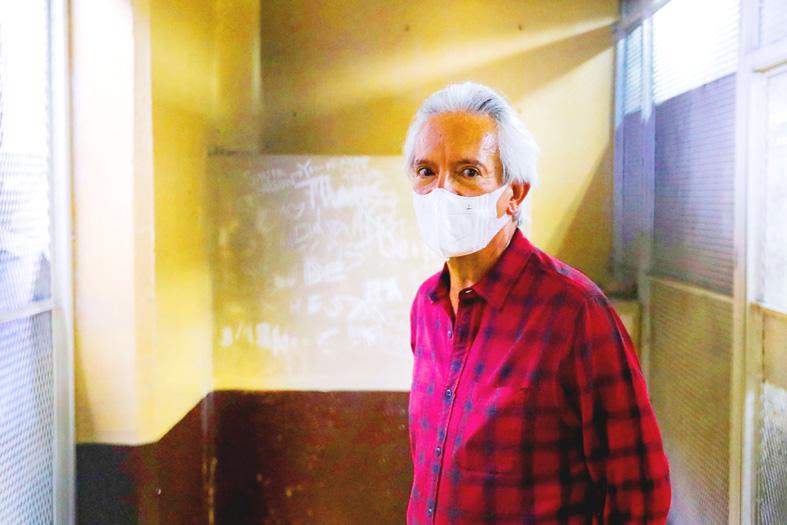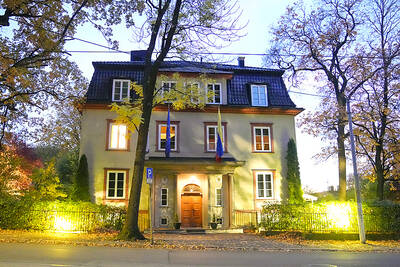A prominent Guatemalan newspaper editor who has overseen investigations into corruption was arrested, prompting denunciations on Saturday by politicians, anticorruption advocates and civic groups.
Prosecution agents arrested Jose Ruben Zamora Marroquin at his home on Friday night, searching his residence, seizing telephones and accusing him of money laundering. Zamora Marroquin is a prize-winning journalist who heads the newspaper El Periodico.
“This is an orchestrated plan, where the aim now is not to pursue those who are corrupt, but rather opponents,” human rights advocate Eleonora Muralles said. “The strategy is to coopt the whole system and have judges — with serious doubts about their impartiality — put together cases and evidence against opponents.”

Photo: Reuters
Journalists on Saturday protested outside a courthouse where the case is being heard.
US Representative James McGovern wrote that he was “deeply concerned” by the detention.
“The judiciary is already decimated, is the Free Press next? Journalism is not a crime!” McGovern wrote on Twitter.
Zamora Marroquin has declared a hunger strike.
“I haven’t eaten anything nor drunk any water in 36 hours,” he said, speaking before a court hearing.
The US government has sharply criticized the weakening of anti-corruption efforts in Guatemala and last year canceled the US visa of Guatemalan Attorney General Consuelo Porras, who has been pursuing former prosecutors who had been conducting corruption investigations against officials.
Several former anti-corruption officials have fled the country. Now that effort appears to have extended to journalists.
Guatemala President Alejandro Giammattei has been dismissive of US officials’ criticism of his attorney general and what they see as a backsliding in Guatemala on battling corruption.
The country’s new special prosecutor against impunity has been placed on a US list of people suspected of corruption or undermining democracy. He is accused of obstructing corruption investigations.
Giammattei’s government and prosecutors accelerated efforts started by his predecessor to undo a UN-backed anti-corruption campaign that put several top officials, including former presidents, behind bars. They say those prosecutions themselves were irregular.
Moreover, a number of the Guatemalans, including two Supreme Court magistrates, were allegedly involved in a scheme to stack the Supreme and Appellate Courts with corrupt judges, a US Department of State report said.
Separately on Saturday, Guatemalan military exchanged fire with the passengers of a vehicle as it approached the location of Giammattei’s entourage, an army spokesman said.
Military officials stopped the vehicle as it neared a checkpoint guarding the presidential delegation during a visit by Giammattei to the area of Huehuetenango, 300km east of Guatemala City, the spokesman said.
The occupants of the vehicle opened fire on the soldiers, who returned fire. Giammattei was about 2km away at the time.
One of the gunmen, who is Mexican, was injured in the confrontation, the government said in a statement.
The others fled in the vehicle toward the Mexican border about 80km, it added.
Four Guatemalans were later detained by the Mexican military, the Guatemalan government said. Two rifle grenades were also found over the border in Mexico.
Additional reporting by Reuters

Police in China detained dozens of pastors of one of its largest underground churches over the weekend, a church spokesperson and relatives said, in the biggest crackdown on Christians since 2018. The detentions, which come amid renewed China-US tensions after Beijing dramatically expanded rare earth export controls last week, drew condemnation from US Secretary of State Marco Rubio, who on Sunday called for the immediate release of the pastors. Pastor Jin Mingri (金明日), founder of Zion Church, an unofficial “house church” not sanctioned by the Chinese government, was detained at his home in the southern city of Beihai on Friday evening, said

Floods on Sunday trapped people in vehicles and homes in Spain as torrential rain drenched the northeastern Catalonia region, a day after downpours unleashed travel chaos on the Mediterranean island of Ibiza. Local media shared videos of roaring torrents of brown water tearing through streets and submerging vehicles. National weather agency AEMET decreed the highest red alert in the province of Tarragona, warning of 180mm of rain in 12 hours in the Ebro River delta. Catalan fire service spokesman Oriol Corbella told reporters people had been caught by surprise, with people trapped “inside vehicles, in buildings, on ground floors.” Santa Barbara Mayor Josep Lluis

The Venezuelan government on Monday said that it would close its embassies in Norway and Australia, and open new ones in Burkina Faso and Zimbabwe in a restructuring of its foreign service, after weeks of growing tensions with the US. The closures are part of the “strategic reassignation of resources,” Venezueland President Nicolas Maduro’s government said in a statement, adding that consular services to Venezuelans in Norway and Australia would be provided by diplomatic missions, with details to be shared in the coming days. The Norwegian Ministry of Foreign Affairs said that it had received notice of the embassy closure, but no

A missing fingertip offers a clue to Mako Nishimura’s criminal past as one of Japan’s few female yakuza, but after clawing her way out of the underworld, she now spends her days helping other retired gangsters reintegrate into society. The multibillion-dollar yakuza organized crime network has long ruled over Japan’s drug rings, illicit gambling dens and sex trade. In the past few years, the empire has started to crumble as members have dwindled and laws targeting mafia are tightened. An intensifying police crackdown has shrunk yakuza forces nationwide, with their numbers dipping below 20,000 last year for the first time since records